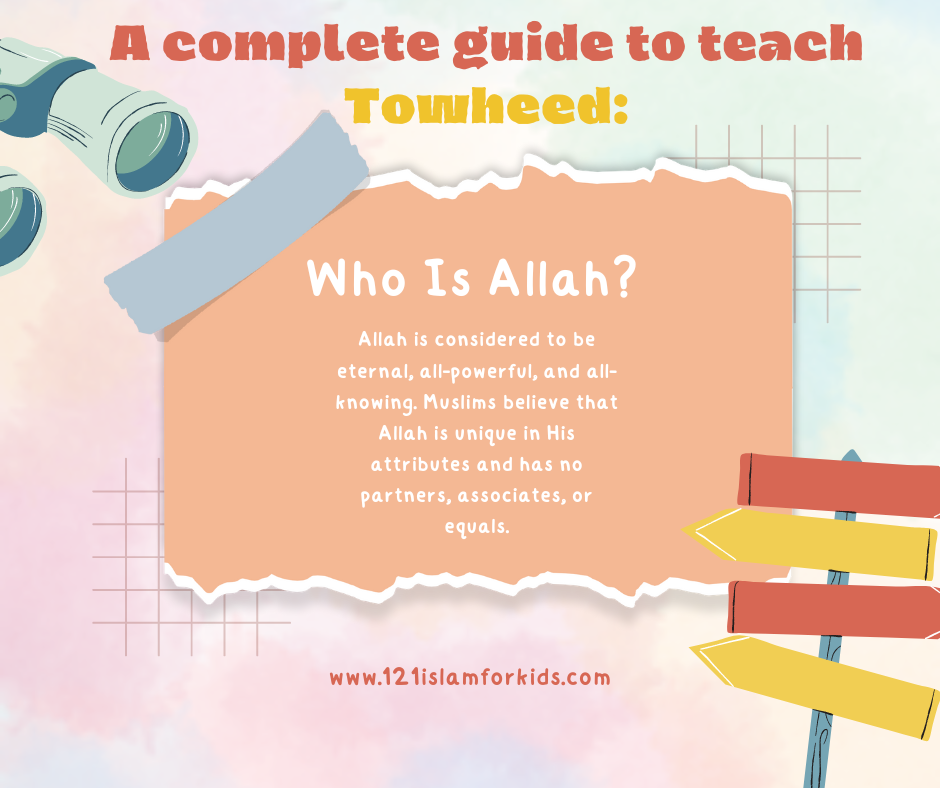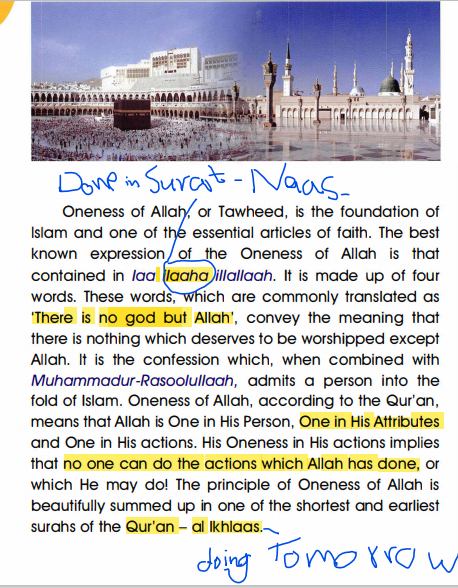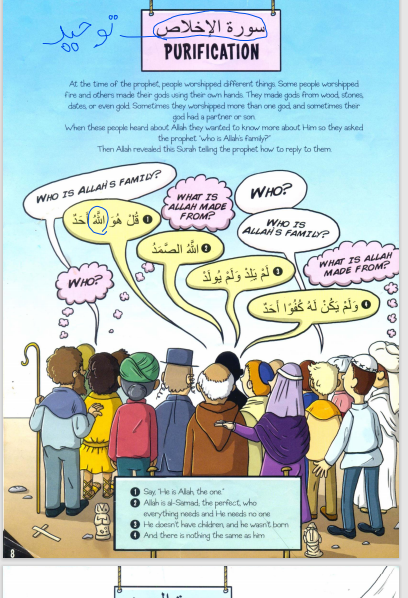Table of Contents

Who is the Allah?
Allah is the Arabic term for God in Islam. Muslims believe that Allah is the one and only true God, the creator and sustainer of the universe. Allah is considered to be eternal, all-powerful, and all-knowing. Muslims believe that Allah is unique in His attributes and has no partners, associates, or equals.
Allah is described in the Quran, which Muslims believe to be the direct word of God as revealed to Prophet Muhammad. The Quran emphasizes Allah’s divine attributes, including His mercy, wisdom, justice, and love. Allah is seen as the source of guidance, the ultimate judge, and the one who responds to the prayers and needs of His creation.
Muslim believe in Allah
Muslims believe that Allah has revealed His will and guidance to humanity through prophets and scriptures, including the Quran. They strive to worship and obey Allah, seeking His pleasure and following the teachings and example of Prophet Muhammad.
Allah is seen as a compassionate and forgiving God, and Muslims are encouraged to develop a personal and intimate relationship with Him through acts of worship, prayer, supplication, and remembrance.
Tawheed: The Oneness of Allah – A Fundamental Belief in Islam
Tawheed is an Arabic term that refers to the concept of the oneness of Allah in Islamic belief. It is derived from the root word “Wahid,” which means “one.” Tawheed encompasses the belief in the absolute unity and uniqueness of Allah, recognizing Him as the one and only true God, with no partners, associates, or equals.
Tawheed is the foundation of Islamic monotheism, highlighting the core belief that Allah is the sole creator, sustainer, and controller of the universe. Muslims firmly affirm that there is no deity worthy of worship except Allah. It involves acknowledging and accepting Allah’s divine attributes, such as His knowledge, power, mercy, and justice.
The concept of Tawheed is based on the teachings of the Quran, which repeatedly emphasizes the oneness of Allah and rejects any form of polytheism or association of partners with Him. It is also supported by the Hadiths (sayings and actions of Prophet Muhammad), where the Prophet emphasized the importance of pure monotheism.
- Tawheed in the Quran:
- “Say, ‘He is Allah, the One and Only. Allah, the Eternal, Absolute. He begets not, nor is He begotten. And there is none comparable unto Him.’” (Quran 112:1-4)
- “Your God is One God; there is no deity except Him, the Entirely Merciful, the Especially Merciful.” (Quran 2:163)
- Numerous verses emphasize the uniqueness, sovereignty, and oneness of Allah.
- Tawheed in the Hadiths:
- Prophet Muhammad said, “Whoever testifies that there is no deity worthy of worship except Allah alone, without partners, and that Muhammad is His servant and messenger, Allah will enter them into Paradise.” (Sahih Muslim)
- The Prophet emphasized the importance of pure monotheism and rejecting any form of polytheism or association of partners with Allah.
- Prophets’ Teachings on Tawheed:
- Prophet Abraham (Ibrahim) taught Tawheed to his people, calling them to worship Allah alone and abandon false gods.
- Prophet Moses (Musa) emphasized the oneness of Allah, as seen in the Ten Commandments.
- Prophet Jesus (Isa) taught monotheism, affirming the worship of Allah alone.
- Categories of Tawheed:
- Tawheed ar-Rububiyyah: The belief in Allah’s lordship, acknowledging His exclusive right to create, sustain, and govern the universe.
- Tawheed al-Uluhiyyah: The belief in the worship of Allah alone, rejecting the worship of anything or anyone else.
- Tawheed al-Asma’ wa al-Sifat: The belief in Allah’s unique names and attributes, recognizing their perfection and incomparability.
- Effects of Tawheed:
- Unity and harmony: Tawheed unifies Muslims and promotes harmony among believers, as they direct their worship solely to Allah.
- Trust in Allah: Belief in Tawheed encourages reliance on Allah’s guidance, mercy, and provision.
- Abandoning idolatry: Tawheed rejects the worship of false deities and objects, freeing believers from superstitions and polytheistic practices.
Tawheed: three aspects:
- Tawheed ar-Rububiyyah: The belief in Allah’s lordship, recognizing that He is the sole creator, sustainer, and controller of all things.
- Tawheed al-Uluhiyyah: The belief in the worship of Allah alone, directing all acts of worship and devotion solely to Him, without associating partners with Him.
- Tawheed al-Asma’ wa al-Sifat: The belief in Allah’s unique names and attributes, acknowledging their perfection and incomparability.
By understanding and affirming Tawheed, Muslims establish a deep connection with Allah, recognizing His supreme authority and surrendering themselves to His will. It brings about unity, clarity of purpose, and a strong sense of devotion, guiding Muslims in their worship, moral conduct, and relationship with Allah and His creation. Tawheed is a fundamental principle in Islam, shaping the faith and practice of Muslims worldwide.
Conclusion: Tawheed, the oneness of Allah, forms the bedrock of Islamic belief. Muslims affirm the uniqueness, sovereignty, and perfection of Allah, worshiping Him alone and rejecting any partners or rivals. The Quranic verses, Hadiths, and teachings of the prophets emphasize the centrality of Tawheed in the Islamic faith. Understanding and embracing Tawheed brings unity, trust, and a profound sense of purpose to the lives of Muslims, as they submit themselves wholly to the worship and service of Allah, the one and only true God.
How we will teach Towheed (Who is Allah) to our students?
Teaching children about the concept of tawhid (the oneness of Allah) and introducing them to the concept of Allah can be done in several ways. Here are some suggestions for teaching children about Allah and fostering their understanding of tawhid:
- Start with age-appropriate explanations: Begin by providing simple and concise explanations suitable for the child’s age and level of understanding. Use language and examples that they can relate to and comprehend easily. ( We will explain it with the help of Islamic education Book )
- Use stories and analogies: Children often respond well to stories and analogies. Utilize age-appropriate stories from Islamic literature or from the lives of the prophets to illustrate the concept of Allah and His oneness. Analogies such as comparing Allah’s oneness to the uniqueness of a parent’s love for their child can also help children grasp the idea.
- Teach through observation: Encourage children to observe and appreciate the signs of Allah’s creation in the world around them. Take them on nature walks, point out the beauty and intricacy of the natural world, and explain that all of it is a reflection of Allah’s creation. ( Art and Craftwork will be down)
- Recite and explain Quranic verses: Select simple verses from the Quran that highlight Allah’s attributes and His oneness. Teach children the Arabic words for Allah and help them understand the meaning and significance of those verses in a way that is accessible to them. ( We have selected Surah Ikhlas and other short verses)
- Practice gratitude and prayer: Teach children to express gratitude to Allah for His blessings, both big and small. Encourage them to say simple prayers, such as thanking Allah for food, family, and other blessings in their lives. Instill in them the habit of turning to Allah in times of need and teaching them that Allah is always there for them.( Asma ul Hasna activity, Some supplications and Calligraphy work will be done. 5 prayers in a day will be also taught to children)
- Lead by example: Children learn by observing their parents and caregivers. Demonstrate your own devotion and connection to Allah through your daily prayers, acts of kindness, and adherence to Islamic principles. This sets a powerful example and reinforces the importance of tawhid in their lives.
- Answer questions patiently: Children are naturally curious and may have many questions about Allah and tawhid. Be patient and open to answering their questions, even if you don’t have all the answers. Encourage them to explore and seek knowledge about Allah and His attributes.
Common questions children might ask
Children may ask a wide range of questions about Allah as they begin to explore and understand the concept of God. Here are some common questions children might ask:
- Who is Allah?
- Is Allah like a person?
- Can we see Allah?
- Where does Allah live?
- How did Allah create everything?
- Why can’t we see Allah?
- Does Allah have a family?
- Does Allah love us?
- Can we talk to Allah?
- Can Allah hear us?
- Why does Allah allow bad things to happen?
- Can Allah make anything happen?
- Why do we pray to Allah?
- How does Allah answer our prayers?
- What does Allah look like?
- How can Allah be everywhere at the same time?
- Why do we say “Allah” instead of another name for God?
- Can Allah make mistakes?
- Does Allah forgive us when we make mistakes?
- Can we ask Allah for anything we want?
It’s important to approach these questions with patience, age-appropriate explanations, and a willingness to explore and learn together. Encouraging children to seek knowledge and providing them with simple, understandable answers will help them develop a better understanding of Allah and their faith.
Remember, teaching children about Allah and tawhid is a gradual process. It is important to be consistent, and patient, and create an environment where they feel comfortable asking questions and learning about their faith
Online class activity:
After Reading the stories of creations and Introduction of Allah from Surah Ikhlaas.
We know about Allah’s creation.
The first Man.
Al-Aleem Allah’s attribution.
Allah has created man ( Story of His creation was told, Allah gathers the soil of all kinds and made a man and then gave him life.
Then Allah gifted his eyes to see, ears to listen, heart to feel, and mind to think)
So Allah Knows what is best for mankind.
Allah knows,
How to live?
He guided us through his book Al-Quran
How to talk?
What is bad and good?
What food and drink is better for us?
All other creatures were created and forced to do what Allah wanted them to do.
But Mankind is free to choose.
Allah Gave him the mind to think what is good and bad.
.
If we will be thankful to Allah , He will increase His blessings.
see the answers given by the kids in the Last picture.


6 Articles of Muslim Faith
Resources:
Books
free books – 121 Islam for Kids
Videos
Courses – 121 Islam for Kids
How is this article? Do you like my teaching method? Enroll your children in our Online class Email or sign up here.

Leave a Reply
You must be logged in to post a comment.